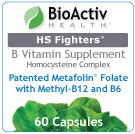Why Vitamins Might Not Protect You
Homocysteine levels may rise if your body is deficient in folate,
vitamin B12 or vitamin B6. More accurately, homocysteine levels
are influenced by the amount of these vitamins your body is able
to activate.
A complex series of biochemical reactions are required to transform vitamins into their active form -- called coenzymes.
The amount of folate, B12 and B6 that you can convert to coenzymes
is often limited by genetic, age-related, and metabolic obstacles:
- Up to 40% of adults are affected by genetic traits which may limit
the amount of folic acid converted to the active form of folate
needed to metabolize homocysteine.
- Transformation of folic
acid into active folate falls off after ingesting 200 mcg, and is
saturated at doses in the region of 400 mcg. Higher doses result
in unabsorbed folic acid circulating in the blood, and the long term biological effects of a lifetime of exposure
to unmodified synthetic folate are not known.
- Even in the presence of normal
concentrations of B12 in the blood, biochemical markers reveal a
shortfall in functional B12 activity for approximately 12% of the population,
particularly the elderly.
- Weak stomach acid, antacids, medications,
atrophic gastritis, intestinal disorders, and declining production
of essential intrinsic factor can impair absorption of all forms of B12.
- Healthy
adults may be deficient in either folate, B12 or B6 at the critical
cell tissue level (where homocysteine is metabolized), even though
blood concentration tests for these nutrients is normal.
Your body must convert three B vitamins to active coenzymes before
they can be used to mantain a health homocysteine level. The body frequently has trouble transforming inactive supplement sources to their required active state.
Next>>
Bio-Active High Absorption Vitamins
>>
| 



